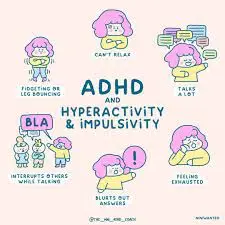
Attention Deficit Hyperactivity Disorder (ADHD) is a neurodevelopmental disorder characterized by persistent patterns of inattention, hyperactivity, and impulsivity that interfere with daily functioning and development. It typicall
Here's a breakdown of the core symptoms:
Inattention: Individuals with ADHD may have difficulty sustaining attention on tasks or activities, often making careless mistakes, having trouble organizing tasks and activities, and being easily distracted by extraneous stimuli. They may also frequently lose things necessary for tasks and seem forgetful in daily activities.
Hyperactivity: Hyperactivity involves excessive motor activity when it's not appropriate. This can include fidgeting, tapping hands or feet, restlessness, and an inability to remain seated in situations where it's expected.
Impulsivity: Impulsivity refers to acting without thinking about the consequences. People with ADHD might interrupt others, blurt out answers before questions are completed, and have difficulty waiting their turn.
There are three main subtypes of ADHD:
Predominantly Inattentive Presentation: Individuals primarily struggle with inattention without significant hyperactive or impulsive symptoms.
Predominantly Hyperactive-Impulsive Presentation: Individuals predominantly exhibit hyperactivity-impulsivity without significant inattentive symptoms.
Combined Presentation: Individuals display symptoms of both inattention and hyperactivity-impulsivity.
The exact cause of ADHD is not fully understood, but a combination of genetic, environmental, and neurological factors likely contributes to its development. It's important to note that ADHD is a clinically diagnosed condition, and proper evaluation by a qualified healthcare professional is necessary for diagnosis and treatment.
Treatment for ADHD typically involves a multimodal approach, which may include behavioral therapy, medication, education and support, and lifestyle modifications. Medications such as stimulants (e.g., methylphenidate, amphetamines) and non-stimulants (e.g., atomoxetine, guanfacine) are commonly used to manage symptoms. However, treatment plans should be tailored to individual needs and may change over time as symptoms evolve.